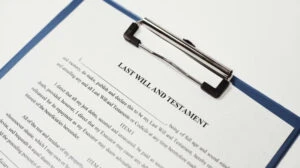
Questions often arise in probate matters as to the validity of the Last Will and Testament that is being probated. Whether the Testament is valid quite often significantly impacts who will and will not inherit from the estate. The following is a brief discussion of some of the most common legal issues involving challenges to Last Will and Testaments.
What Is a Forced Heir?
First and foremost, under Louisiana law, a decedent can leave their assets to anyone they name in their Last Will and Testament. This means they can choose to not leave anything to their kids if they so desire. The only exception to this is if there is a child who qualifies as a “forced heir.” Forced heirs are children under the age of 24 years of age, or children who suffer from a mental or physical disability that prevents them from taking care of themselves. Louisiana law provides that a “forced heir” is entitled to receive a portion of the decedent’s estate even if the forced heir was not named in the Last Will and Testament. An heir who is not a forced heir, who is left out of the Last Will and Testament, does not have a legal basis to challenge the validity of the Testaments simply because it unfairly leaves them out.

Injured on Someone Else’s Property?
Know Your RightsOur expert premises liability lawyers will help you hold negligent property owners accountable.
Get a Free Case Evaluation
504-500-1111Photocopies of a Will Are Not Acceptable
One common, and often successful, challenge that is made to challenge a testament is to establish that the testament is a photocopy and not the original document. Louisiana law requires that the original Last Will and Testament, not a copy, be used for probate. If the original Last Will and Testament cannot be found, there is a presumption under the law that the decedent destroyed and revoked the Testament before their death. If revoked, a copy of the testament cannot be used for probate. There is an exception however that does permit the use of a copy in place of the original, but only when there is evidence that the original was unintentionally lost or destroyed by the decedent. An example would be when there is evidence that the decedent kept the original testament in their home and the home was accidentally lost in the fire. When such evidence is not present, however, the original Last Will and Testament is required for probate.
The Format of the Will Matters
A Last Will and Testament can also be invalidated when it is not in the proper legal format. Louisiana law specifically provides legal requirements that must be met in order for a testament to be valid. For example, if the testament is handwritten by the decedent, the law requires that the entire Testament be in the handwriting of the decedent including the date, body, and signature on the document. Quite often, it can be proved that someone else wrote the will and that the decedent only signed it. If that is proven, the Last Will and Testament is invalid and can be successfully challenged. For notarial Wills, Louisiana law requires that each page of the Last Will and Testament must be signed by the testator and that a valid attestation clause appear at the end of the Last Will and Testament and that it be properly executed before a notary and two witnesses. If any of these requirements are not met the Last Will and Testament can be invalided.
Harmed by a Dangerous Defective Product?
We’re Here for YouOur experienced product liability attorneys will fight to secure the compensation you deserve for your injuries.
Schedule a Free Consultation
504-500-1111Who Can Be a Witness?
It is also possible to invalidate certain parts of the Last Will and Testament. Louisiana has specific rules on who cannot serve as a witness to a Last Will and Testament. Anyone who will inherit something pursuant to the testament is precluded from serving as a witness to the testament. For example, if a Last Will and Testament leaves a cash gift to a friend of the decedent who also signed as a witness on the Testament, then the provision of the testament relating to that gift would be invalid.
Slip and Fall Accident?
Get the Legal Support You NeedOur dedicated slip and fall attorneys will help you navigate the legal process and claim the compensation you deserve.
Speak to a Lawyer Today
504-500-1111Forgery Invalidates a Will
Forgery of the decedent’s signature is also a ground for invalidating a testament. Clearly, in order for a Last Will and Testament to be valid, it must be signed by the decedent. In order to prove that a Will was forged, it is usually necessary to hire a handwriting expert to analyze the signature on the testament. Samples of the decedent’s handwriting are obtained to compare the handwriting on the Last Will and Testament to in order determine whether the signature is a forgery. Other factors such as the decedents’ health and physical abilities on the date the Last Will and Testament that may have affected his/her handwriting are considered in this analysis. If it is proven that the Testament was forged, the Last Will and Testament is invalidated.
The Will-Maker Must Be of Sound Mind
Finally, the decedent’s mental capacity and whether he or she was capable of understanding what they were doing at the time the Will was made is another possible way to invalidate a testament. Often, a Last Will and Testament is signed late in life and sometimes right before death. If the decedent was not of sound mind or under the influence of heavy medication at the time, it becomes questionable as to whether he/she could understand what was being done. This is often the case when the decedent was suffering from Alzheimer’s, dementia, or other mental disorders. To invalidate a testament in this situation, medical evidence of the decedent’s condition is needed to prove the decedent lacked mental ability to make a Last Will and Testament.
These are just some of the most common challenges that can be made to invalidate a Last Will and Testament. The advice of an experienced succession attorney is needed to review the facts of a particular case to determine if a successful challenge to a testament can be made.
Scott Vicknair, LLC attorneys can effectively protect your rights and interests …
However complicated the family dynamics, however sizable the estate, and regardless of whether you’re seeking to bring a claim, preserve the status quo, or defend yourself. Call (504) 500-1111 or contact us online to discuss your situation and how we can help.

